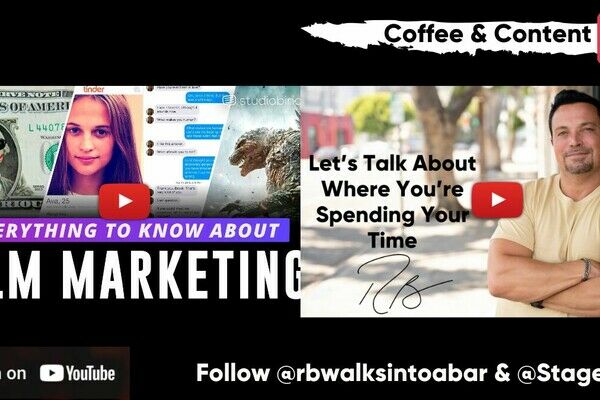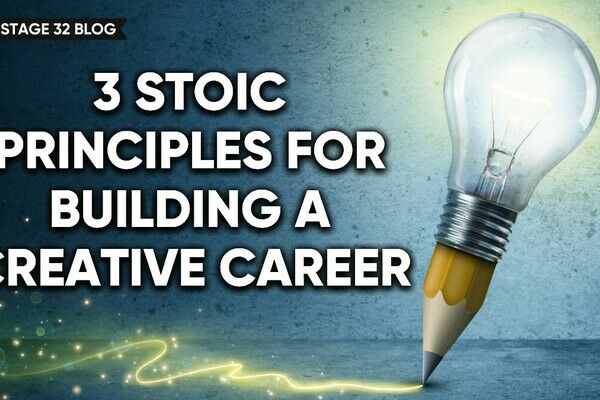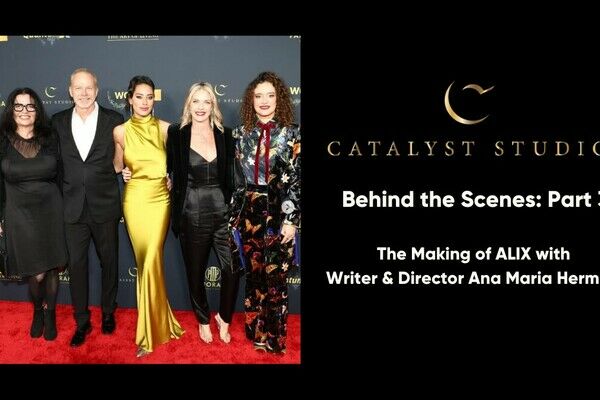Part II: ACTOR MUSCLE: Handling "Rejection" & "Failure" & Surviving Yourself
 Richard "RB" Botto
Richard "RB" Botto 30 year acting veteran of film, stage, and television, Beverly Leech, returns today with Part II of her "Actor Muscle" series. My thanks to all of you who left remarks or questions in the Comments section after Part I – I appreciate the contributions.
To read Part I of Beverly's guest series, click here: ACTOR MUSCLE: Handling "Rejection" & "Failure" & Surviving Yourself (Part I)
Enjoy,
RB
Training?! Isn’t There An App For That?
I went to a film premiere recently and a very young, very handsome guy asked if I was an actress. I said, "Yes". He said, "Great! Can I sit next to you?" In the next few minutes, this total stranger gave me a brief but detailed spin of his life: yes, he was an actor, but unemployed. He'd had a series, but it was cancelled. Now, his manager wouldn't return his calls, and his auditions recently had been awful and unnerving. I casually suggested that he might use this downtime to take a class, stay fluid for his next break and feel like a 'working actor'. He actually turned pale... stubbornly set his jaw and scoffed, 'Training! I wouldn't ruin myself with training!" This beautiful little sun god thought training would smother his natural talent. I sweetly replied that maybe, you know, he think about it... [After all, if he keeps doing what he's doing, he'll likely keep getting what he's getting - unemployed]. I get it, though. I ran on my own 'natural instincts' for years. Then I hit a wall. It was like having a race car engine without a license to drive it. Nothing feels worse than knowing I'm a faker, reaching for the same, stale bag of tricks. I had to shake that friggin bag up and learn something NEW, something larger than just myself. Training didn't kill "me". No, I discovered that it challenged me to be a better 'me'. Talent is good, talent will get you work, but if you don't grow, you go
Training (the right training) gave me actor muscle, and has kept me inspired and on-track. It's there to enlarge you, not entrap you. I went to several auditions recently - rooms full of women I've never laid eyes on in my life. I remember I used to see the same pool of women 15 years ago at the rounds. Five years later, some were missing. Another 5 years, even less. Today? One, maybe 3. And yet, I'm still here. I couldn't help but think about that guy. I hope he thought about me, too... and took that class.
SURVIVING NERVES AND STAGE FRIGHT
Recent question by an actor: "I'm terribly nervous about an audition next week. Auditioning has always been my weakness. Any pointers?"
- You can't afford to be nervous. Tension is the actors greatest enemy - it chokes off all creative impulse and heartbeat, rearranges your body and voice in to all sorts of tics, kills timing, and we hear the words, but do not see a human being having a human experience in truth.
- Casting doesn't give you an appointment because they want you to suck, they want you to be good. They are rooting for you, so they're not the enemy. No matter how uninspired their "listening faces" are, they're listening, not judge/jury/executioner.
- I've been in the business for 30 years - I still get nervous, I've just learned to absorb it in a way I don't fall apart, and have other methods to overcome it - namely reverse psychology and rehearsal. For me stage fright has the same symptoms as Christmas morning when I was 6 years old: my hands sweat, my mind is racing, my breath shallow and all my senses are heightened. The big difference is the frame of mind, so flip your reference: stage fright keeps me paralyzed, Christmas morning fills me with anticipation - I cannot wait to get in to the room.
- The other times I'm the MOST nervous & neurotic are those when I'm not prepared or haven't rehearsed enough; or just memorized words, without enough time or thought to the experience of the character. Notice I said "experience", not feelings/emotions. Feelings are the first thing to dry up because of adrenalin and nerves. But if I'm rehearsed, love that little slice of the character’s life and time, and go to the experience of living that, then the feelings come without force or manipulation. Experience is not just feelings, it's much larger. It's the time of life, the place, the conflict, who you're talking to, the whole banana, but mostly? you believing in all of this yourself. If you don’t love your character, you’d better find a way inside them and make them important. So just love your work, and let the magic happen.
- It takes time and experience learning to build up enough actor muscle (inner strength) to offset nerves/stage fright, to stay unflappable, but you do survive. You learn and you go to the next one. And the next one is better. And the next one too. And if you happen to blow large, nasty chunks at the aud? So What! It’s not terminal. TAKE THE BULLET, TUCK AND ROLL, GET UP, AND MOVE ON. The most important part of this last bit is to... GET. UP.
PRAY WITH A FEATHER NOT A PICKAX
"Pray with a feather, not a pickax", said my coach after I'd called her in a tiff over some role I was trying to master, "Tension is the Actor's worst enemy". Tiffs and tantrums happen when I'm working too hard in rehearsals or on a set; or when I'm angry or afraid; or if I'm working on a character that is psychologically difficult or beyond my understanding. I used to think I could master that beast if I just put my back into it, muscle it down to my will. However, I have learned that the solutions to my creative challenges come more easily if I build breaks into my day after a few hours of intense work. When on a set and my lunch is only a half-hour, I POWER NAP [with my legs raised above my heart to double the nap time, bringing more oxygen in the blood to my brain... and I won’t wake up groggy in the head]. In rehearsals, I’ve have had countless experiences where I couldn't get inside the character. Defeated and upset, I fall into bed, only to wake up with a marvelous idea or a small, effortless insight that resolves the issue. Insight comes when I'm wide open, and that can only be achieved in a tension-free mind and body. Rest.
CASTING DIRECTORS... IT’S NOT PERSONAL
The biggest piece of wisdom I can give the young professional building the early stages of a career is: It’s not personal. None of it.
A Casting Director hasn't given you an appointment because they want you to SUCK. You're there precisely because they WANT you to be good. They’re rooting for you to book so they move on to the next role. So give up any conspiracy theories and own your powerlessness over decisions actually made by powers greater than a Casting Director.
Sure I've been fooled by the poker face. For months, years, I stood before X, and just when I was sure she hated my guts, she'd book me. That scowl was just her face, not me, and certainly not the value my insecurity gave it. After getting to know her, I discovered what a compassionate and hard-working woman she was. I cannot speak for all casting directors, but I can put myself in their shoes, & it wouldn't be hard to know why their implacable faces are part of the job. They are paid to be neutral 3rd party observers. Let them do their job. They’ve read multiple drafts and heard that joke a hundred times – they know it’s coming and many times they’re even instructed NOT to laugh. So trust your timing and move the comedy scene forward. They have to scribble notes, it helps them remember you after seeing 100’s of actors, and they may even be writing great things about you. It’s just their job – let them do their job.
In fact, their dynamics is very similar to ours. They go from show to show, and their next contract is based on how well they cast their last one. They’re given very little time to read, prep and cast a show. Like us, they do the best they can with the time and materials they’re given. It’s not about you. It’s not about me. It’s not even about them. It’s a much bigger picture with a lot more activity, so, that face? It’s a raincoat they put on in a rainstorm. Let them have their survival tools. If I were standing in the rain, I’d put one on, too.
Imagine being the middle man for dozens of egos, juggling the budgets and eccentricities of producers, directors, studio execs, not to mention the egos of the 100's of actors they've just seen in the last 2 days. They witness aggressive and cutting personalities and they absorb all of that on your behalf like a buffer. If they’re tough it’s because they’re good at what they do and they’re just as powerless as we are when the climate changes. Sometimes a script change comes in seconds before you’re called in to read. And that character of the self-deprecating piece of sunshine you were reading for, has just now been changed to a chain-smoking, ball-busting curmudgeon – using the same dialogue, none of which supports the change. An impossible rock and a hard place for you both, so be a good sport and weather it together.
The only way to survive the casting cycles is to realize you’re not there to book the job, you’re there to make fans. No canoodling, no BFF’s, no ass kissing, just fans. You’ll have their respect if you don’t fall to pieces because you’ve allowed the audition environment to rob you of your humanity. All they want to see is an actor giving their character humanity and having a human experience. So, give Casting a break and do YOUR job. The only thing I will ever have power over is a good attitude and preparedness. The secret is simple: Suit up. Show up. Throw down. Go Home.
NEWS AT 11. schmACTOR TAKES HOSTAGES AT CALLBACK
Youngbloods starting in the business, even great veteran actors, may think their full rehearsal work is appropriate for an audition. No, most often no. Maybe for rehearsals, but in auditions, casting and production is gonna give you 2 minutes to be brilliant. Same with professional theatre. They all have a time limit (2-5-10 minutes) then, it's "Thank you, that'll be all". The artistic life still has to meet the standards of the business world, and time is money. I know, it’s hard to stay alive artistically and stay mindful of the business of acting. My solution? When I have complex characters that demand deep work, I start days in advance of an audition. I work my ass off and I go to treacherous places...I pave the road to hell and I visit every day. Then the morning of the audition, I visit again, stay awhile, get my motor really hot, drive to the appointment and throw down. Wrestling with all those demons, is the kind of stuff that you do privately, in class/lab or rehearsal. In a callback, it's down to just a few actors, so Casting & Production at this point, just want to see it. They don't want to see me working up to it.
Once upon a time, there was a brilliant actor, X. He went to a callback for a very difficult play and a superb character, and was quite perfect for the part. But, spent a half hour on stage in front of them ‘finding' the character for a 10 minute scene. X spent the first 2 minutes confrontational, literally staring down the Director, spitting on the floor, and the next 28 minutes working his paces, breaking up the scene to go inside himself... and sometimes saying the words. Maybe it was a character choice to shock and offend, but probably not to the effect the actor intended. Two of the producers said they felt like X’d taken them hostage. The writer was upset he didn't hear his words. The Casting Director was cool - loved actors, just said 'oh, he's really method' - and wasn't that put off (thank god) even though it messed up the appointment times for the rest of the day. As for me, I thought it was ballsy and brilliant, but it cost a most deserving actor a great part, all because he was self-indulgent. If he'd opened with the bold moves, then moved right into the material, he probably would have been cast. I know this guy- he's not insane in performance or life, but the producers don’t know him like I do.
I think X actually knew better but took the risk anyway. Producers know there's other actors with talent AND the self-discipline to show their best in the first few minutes. If you’re a star it’s a different discussion, but if you’re a worker bee (as most of us are) the producers need to know that you’re not going to waste time because time is money. Taking 30 minutes to get in sync for a 2 page scene is potential train wreck to a production schedule that has anywhere from 4-15 set-ups for each scene. You take that long for each take and the producer has some overtime to pay and location contracts to upset. Or you’ll simply force them to cut your part in post if they can’t make time for the proper coverage (medium shots and closeups) on the front end. In an Equity play, they pay the full company to rehearse, not just you. The audition setting is where they gauge not only your talent, but whether or not you're ready when they call “Action”. Work smart and don't be a baby. There are efficient ways to maintain your artistry, internalize your methods and streamline your delivery. Prep early, work deep, arrive early, but BE READY to throw down when you come in. They’ll think you’re a genius if you keep your methods to yourself.
Don't forget to check out ACTOR MUSCLE: CRAFT, GRIT, WIT: A Professional Guide to the Business of Acting and ACTOR MUSCLE: Nuts and Bolts to Audition Technique on Amazon here:
Beverly is available for questions and remarks in the Comments section below.
| Stage 32 iPhone App Now Live! |
| Part I: ACTOR MUSCLE: Handling "Rejection" & "Failure" & Surviving Yourself |












